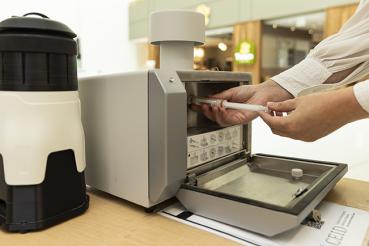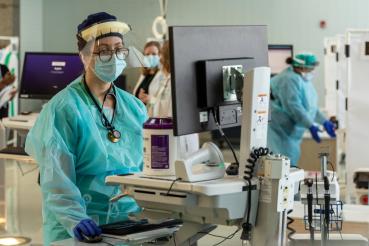It has been nearly a year since the pandemic started impacting our lives, disrupting routines and negatively affecting us in various ways, including socially, economically and emotionally. With so much adversity and uncertainty, it can be difficult to cope. And for people impacted by cancer and the pandemic, coping skills have been even further stretched.
“It has been really challenging to strike a balance between maintaining connections and staying safe,” says Yasmin Asvat, PhD, a clinical psychologist with the Rush University Cancer Center. She recently gave a virtual presentation to Waterford Place participants on “Strategies to Cope with Loneliness During COVID-19” and suggests the following ways to adapt and increase your coping abilities.
1. Care for your body.
- Eat right and hydrate. “Healthy nutrition and hydration are essential for a healthy immune system,” Asvat says. To make nutrition more interesting, she suggests trying a new recipe or cuisine, or planting a vegetable or herb garden — but check with your provider first if you are in active treatment. Combine good nutrition with a bit of social connection by hosting a socially distanced potluck with family or neighbors. Have each person prepare a dish, then divide it in portions to be dropped off at each participant’s home.
- Move more. Moderate exercise supports physical and emotional health. Wear a mask and go for a walk, join a virtual exercise class at Waterford Place or find a free exercise video on YouTube.
- Get six to eight hours of sleep. Establish a relaxing bedtime routine, banning electronics before bed. “Blue light interferes with parts of the brain that regulate sleep,” Asvat explains, “so falling asleep to the TV, tablet or smartphone is not a good idea.” Try soothing music or white noise instead. Reading, relaxation and meditation are also good options for winding down at bedtime. If you need help getting to sleep or staying asleep, consult with your doctor or a psychologist.
2. Make your emotional health a priority.
“Honor your emotions with self-compassion,” Asvat advises. “We are all human, and we’re all struggling.” Extend comfort and kindness to yourself, she says, and make room for hope, whether you hope to go on a vacation when the pandemic is over, visit with your children or grandchildren, or even just be next in line for the COVID-19 vaccine.
Be intentional about recharging your emotional battery.
- Make both exercise and relaxation, like deep breathing and mindfulness, part of your daily routine.
- Music and dancing are good for the soul, as are spiritual or faith-based practices.
- Stay connected to your hobbies, and maintain your social connections and support groups virtually.
- Give yourself permission to set boundaries with people who may drain your energy. Asvat says you don’t have to cut them off completely, but she advises limiting your contact with them.
If you are struggling with more severe depression or anxiety, seek professional help.
3. Connect with what matters.
“There is always a way to connect,” Asvat says.
Determine your priorities and let them be your personal compass to identify the key areas of life that are crucial for you to connect with. Asvat cites the example of a young girl who loved soccer but was no longer able to play due to illness. She was able to connect by coaching and watching others play — even if it was only on TV.
“Focus on what is safe and possible to do versus what is not,” Asvat says. Be flexible and creative, which will enable you to adapt.
4. Contribute to the well-being of others.
“We benefit when we support others,” Asvat says. “Take the initiative to call to check in with friends and family, even those you may not have connected with in a long time.” Donate time, food, money or goods as you are able.
5. Connect creatively.
Facebook video calls and sharing photos and videos via text messages are all ways to stay connected. Asvat suggests writing letters or sending cards and gifts through the mail. “Young people may never have received a letter,” she says.
Try a virtual get-together with a purpose, like a virtual coffee, virtual book club, virtual cooking lesson or baking session, virtual game night or even a virtual wine tasting. “While virtual connections may not be as satisfying as real-life connections, they do help us interact in a meaningful way while we protect ourselves from COVID-19. And it’s always better to connect virtually than to not connect at all.”




